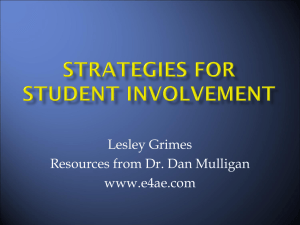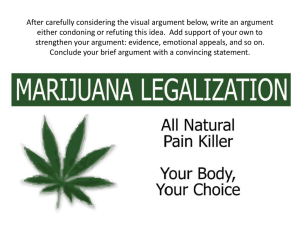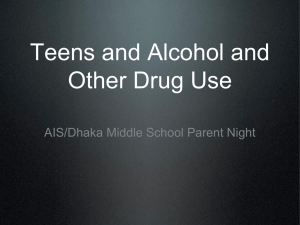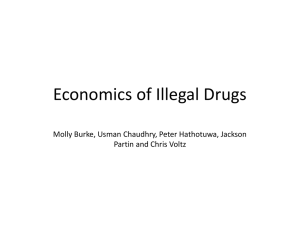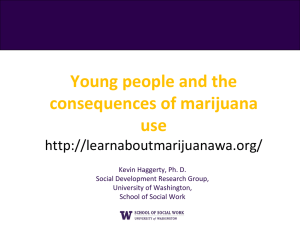2014-12-07_Paula_D._Gordon_Ph.D
advertisement
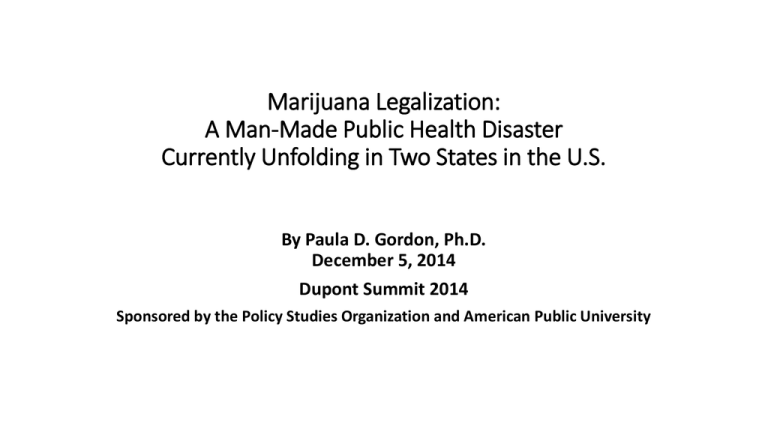
Marijuana Legalization: A Man-Made Public Health Disaster Currently Unfolding in Two States in the U.S. By Paula D. Gordon, Ph.D. December 5, 2014 Dupont Summit 2014 Sponsored by the Policy Studies Organization and American Public University What should be the basis for sound public policy regarding marijuana? While Amsterdam and Switzerland have had second thoughts about the permissiveness of drug laws, and while the states of Colorado and Washington have legalized the recreational use of marijuana and individuals in those states are increasingly concerned about the effects of this change in policy, Oregon and Alaska along with the District of Columbia have passed initiatives to legalize the recreational use of marijuana. Is this sensible public policy? 2 The effects of marijuana use on mental, psychological, physical, social, and public health Reports indicate that marijuana use has significant consequences for mental, psychological, and physical health, social and public health in general. So why would any public official or legislator want to legalize it? Why would any voter want to legalize it? 3 Marijuana as a mild to strong hallucinogen depending on the level of THC Do those promoting or condoning its legalization know about widely available research its effects? Do they know that marijuana use profoundly affects brain functioning and IQ levels of those under the age of 25 because their brains are still developing? (Some experts say the brain is developing into the late 20s or even the 50s.) Do they know that the Tetrahydrocannabinol (THC) content of marijuana today can be 10 times more potent than the THC content of marijuana that was widely available several decades ago? 4 Additional References of Note • Hundreds of references can be found in reports, articles and a 33 plus page list of references at http://GordonDrugAbusePrevention.com. • Most compelling, are recent findings outlined by Dr. Nora Volkow, director of the National Institute of Drug Abuse, in an interview with the Dalai Lama. The exchange took place in the fall of 2013 in India and focused on the effects of mood-altering substances, including marijuana, on human behavior and brain function. 5 Additional References of Note (Continued) • In addition, research recently published in the April 16, 2014 Journal of Neuroscience revealed that structural anomalies have been found in the brains of casual users, anomalies that are linked to disruptions in behavior, cognition, memory, and decision-making capability. • Long term behavioral effects, including an increase in drop out rates, an increase in unemployment, and a seven fold increase in suicide attempts in young users of marijuana have been reported by The Lancet Psychiatry in its September 9, 2014 issue. 6 Additional References of Note (Continued) • An extensive review entitled “What has research over the past two decades revealed about the adverse health effects of recreational cannabis use?” was published October 7, 2014. In it, Professor Wayne Hall, National Addiction Center at King’s College in London revealed among many other findings that one in six youth who use marijuana becomes addicted and one in ten adults becomes addicted. (See http://onlinelibrary.wiley.com/doi/10.1111/add.12703/full ) 7 Additional References of Note (Continued) • In the November 25, 2014 Proceedings of the National Academy of Sciences, researchers at the University of Texas and the University of New Mexico report on studies finding the shrinkage in the brains of marijuana users (See “Long term effects of marijuana on the brain” at http://m.pnas.org/content/111/47/16913.abstract ) . 8 Failure to Acknowledge or Be Aware of the Most Significant Research Findings • The proponents of marijuana legalization do not seem to be paying attention to these significant research findings. They dismiss such findings as out of hand, holding fast to their view that marijuana is a “relatively” harmless substance. • In some cases, proponents may not know about the wide array of research available on the effects of marijuana and they may not have the expertise to understand the significance of those findings. 9 Failure to Acknowledge or Be Aware of the Most Significant Research Findings (Continued) • Many people who have come to believe that marijuana is “relatively harmless” are caught in a time warp and are citing inconclusive cherry-picked research that is ten to fifteen years old. They also tend to be unaware that today’s marijuana can be ten or more times stronger than the marijuana that was used decades ago. 10 Are those who support legalization uninformed concerning the harmful effects of marijuana use? Unfortunately, those who support legalization seem to be ill-informed or uninformed. How else might their arguments in favor of marijuana legalization be characterized? The arguments are varied but ignore key facts. If marijuana were a drug regulated by the FDA, the list of the side effects and warnings would not begin to fit on a pack of marijuana joints. In fact, owing to the many side effects of all kinds, the use of marijuana would only be allowed to be used for certain conditions by prescription and under the strict supervision of a doctor. More about what an FDA warning label might look like later. 11 Some often heard arguments favoring the legalization of the use of marijuana • Libertarian Argument: • Social Justice Argument: • The Argument that “Big Marijuana” Can Help the Economy • The Argument that States Have the Right to Legalize Marijuana • Tax Revenue Argument All of these arguments overlook the fact that there are Federal laws that keep the use and distribution of marijuana illegal and there are international treaties to which the U.S. is a signatory that are abrogated when those laws are ignored and broken. 12 Libertarian and Civil Libertarian Arguments: • Argument: “It is my life, my mind and my body and I should be free to do what I want to with them” or “I should be free to use the intoxicant of my choice” and “My use of marijuana is not hurting anyone.” • Response: Is marijuana use a victimless act if it affects the lives of all those around the user, not to mention the life and health of the user? Is marijuana use an innocuous act if it has known harmful effects on the developing brains of those who use it? Is it an innocuous act if it affects one’s behavior and mental functioning? What are the consequences of a “stoned” citizenry? Can a representative democracy afford to have a dumbed down or partially stoned electorate? 13 Social Justice Argument: • Argument: “It is unconscionable that society should disproportionately make criminals of individuals who use marijuana who are from lower socioeconomic groups.” • Response: Agreed. It is a fact that more individuals from lower socioeconomic groups are negatively affected by marijuana laws as they are often implemented. The remedy, however, is not legalization which only increases its use, including among lower socioeconomic groups. A better remedy is to use the justice system to give users from all walks of life the option of being remanded users to drug court programs and other programs that emphasize counselling, education, and treatment and rehabilitation. Through judicial discretion, this can be done without giving individuals criminal records. The aim of drug courts and other similar programs have been to discourage use of mood- and mind-altering drugs and help all individuals fulfil their potential as healthy, functioning individuals. Making marijuana use legal simply sends the false message that the marijuana has insignificant, harmless consequences to the individual and society, when in fact its use has significant harmful effects. 14 Argument that “Big Marijuana” Can Help the Economy • Argument: “Turning marijuana sales and distribution into a regulated business will benefit the economy. We can then regulate its use more carefully; treat it as alcohol and tobacco are treated; do away with the black or gray markets and intrusion of organized crime and cartels, and keep it out of the hands of those under the age of 21.” • Response: Indeed, what is currently happening in Colorado and Washington is that many individuals are making large amounts of money selling drugs in the black or gray markets, undercutting the prices that the “legal” dealers are charging. Reports indicate the numbers of users of all ages are increasing, including those who live in nearby states. According to reports, the number of individuals seeking treatment had already been growing in the years prior to the legalization of recreational use of marijuana. In addition, traffic fatalities in Colorado involving drivers testing positive for marijuana had already increased by 114 percent from 2006 to 2011. Anyone familiar with the effects of marijuana on cognition, memory, concentration, judgment, perception, sense of space and time, knows full well that users cannot safely drive or operate machinery. 15 The Argument that States Have the Right to Legalize Marijuana • Argument: “States have the right to legalize the use of marijuana even though it is in contravention of international treaties and federal law.” • Response: The President has a constitutional obligation under Article II, Sec. 3 to “take care that the laws be faithfully executed.” The President is clearly not enforcing the Controlled Substance Act, which pertains to the control, distribution and use of marijuana. He is allowing the abrogation of international treaties to which the U.S. is signatory. This leads to the following questions: What are the implications for the future viability of the rule of law and the Constitution when states act in ways that are counter to international treaties and federal law? Or when the Department of Justice and the President allow states to abrogate international treaties and federal law? An article on “The Illegality of Legalizing Marijuana Use: An Open Plea to the President and Other Sworn Public Officials…” by the author at Family Security Matters focuses in further detail on these concerns. 16 A Public Health Perspective That Does Not Favor Legalization, But Favors Non-Punitive Alternatives Involving Counselling, Treatment, & Rehabilitation • It is a fact that more individuals from lower socioeconomic groups are negatively affected by marijuana laws. The remedy, however, is not legalization which only increases its use, including among lower socioeconomic groups. A better remedy is to use the justice system to allow for the option of remanding users from all walks of life to drug court programs and other programs that emphasize counselling, education, and treatment and rehabilitation. Through judicial discretion, this can be done without giving individuals criminal records. The aim of drug courts and other similar programs have been to discourage use of mood- and mindaltering drugs and help all individuals fulfil their potential as healthy, functioning individuals. Making marijuana use legal simply sends the false message that the marijuana has insignificant, harmless consequences to the individual and society, when in fact its use has significant harmful effects. 17 The Public Health Perspective Can Prevail If Individuals Become Familiar with the Research and with the Unfolding Developments in the US • People will throughout the country will be increasingly aware of the negative effects, the costs, and consequences of the use of marijuana and the legalization of marijuana use. • Websites of particular note (including information concerning the wide range of problems that have occurred since 2013 in Colorado and Washington and surrounding states): The Marijuana Report.Org http://legalizationviolations.org/ http://learningaboutSAM.org http://GordonDrugAbusePrevention.com 18 Selected headlines and topics from the last seven months of 2014 found at http://legalizationviolations.org (Continued) • Pot Poisoning Lawsuit Defendant Alleges Sabotage • Toddler Tests Positive for Marijuana • Marijuana Lollipop Leaves One Conn. Student Hospitalized • State Tracking Spike in Minors Exposed to E-Cigarettes, Marijuana • Children’s Hospital Sees Surge in Kids Accidentally Eating Marijuana • Kids Poisoned by Medical Marijuana, Study Finds 19 Selected headlines and topics from the last seven months of 2014 found at http://legalizationviolations.org (Continued) • Colo. Teen Addiction Centers Gear Up for Legal Pot • Student’s death in Colorado raises questions on pot and health • Colorado’s neighbors dismayed by new wave of marijuana traffic • Three Oklahoma City residents arrested in Colorado marijuana distribution conspiracy • Lives At Put At Risk As Hash Explosions Are On The Rise 20 Selected headlines and topics from the last seven months of 2014 found at http://legalizationviolations.org (Continued) • Complaint: Driver in Deadly Crash Smoked Pot (December 2, 2014) • Pot-Positive Traffic Fatalities up 100% in Colorado (November 28, 2014) • 7 Harmful Side Effects Pot Legalization Has Caused in Colorado • Marijuana Poisoning Incidents Spike in Washington State (November 19, 2014 • Marijuana Public Consumption Tickets Up 471 Percent in Denver 21 Selected headlines and topics from the last seven months of 2014 found at http://legalizationviolations.org (Continued) • 5 High Schoolers Fall Sick after Eating Marijuana-Laced Brownies • Denver Man Accused of Killing Wife after Eating Marijuana Candy Formally Charged with Murder • Colorado-Based Doctor Warns Georgia about Medical Marijuana • Alleged Intoxicated Driver in Fatal Trick-or-Treater Crash in Court 22 Selected headlines and topics from the last seven months of 2014 found at http://legalizationviolations.org (Continued) • State Tracking Spike in Minors Exposed to e-Cigarettes, Marijuana • In tiny Nebraska towns, a flood of Colorado marijuana • Hash oil explosions rise with legalized marijuana • Colorado deaths stoke worries about pot edibles • Law enforcement from neighboring states agree, Colorado has strongest marijuana in the world 23 Selected headlines and topics from the last seven months of 2014 found at http://legalizationviolations.org (Continued) • Colorado’s marijuana sales draining Nebraska budget • Accidental Pot Poisoning in Kids Continues Upward Trend • Colorado deaths stoke worries about pot edibles • Law enforcement from neighboring states agree, Colorado has strongest marijuana in the world • Colorado’s marijuana sales draining Nebraska budget 24 Increasingly Conservative Recommendations of a Pro-Legalization Organization: Do not use if you are under 21. [This of course neglects the fact that the brain is still developing and its functioning is impaired after the age of 21.] Do not use if you are pregnant or nursing [Note: Legal dispensaries in Colorado and elsewhere provide such warnings to women who are pregnant or nursing.] Do not use and drive. Do not use around people who are sensitive to the effects of marijuana and who do not want to be around people who are using marijuana. 25 Continuing Habit of Pro-Marijuana Organizations and Sites to Cite Scientific Literature That is Ten to Fifteen Years Old & Ignore Recent Findings • Consistent failure to acknowledge or understand the significance most compelling scientific research beginning with the study by Harris Isbell and colleagues decades ago showing that THC has idiosyncratic psychotomimetic effects in human subjects and through and including research findings published in 2014 showing that anomalies have been found in the brains of casual users and longitudinal studies that have found a wide range of negative results of using marijuana, from the increase in drop out and unemployment rates to a significantly high incidence of suicide attempts. 26 A Hypothetical FDA Warning Label Were Marijuana Ever Considered Safe Enough for Use as Cigarettes and Were Similarly Regulated by the FDA • Marijuana should not be used if an individual has a history of mental health problems. • Marijuana use has been shown conclusively to have idiosyncratic psychotomimetic effects in previously healthy subjects. • Marijuana should not be used by individuals who have a propensity for violence, including persons who have difficulty handling their anger and individuals who have sociopathic tendencies. 27 A Hypothetical FDA Warning Label Were Marijuana Ever Considered Safe Enough for Use as Cigarettes & Were Similarly Regulated by the FDA (Continued) • Marijuana should not be used if an individual is contemplating having children. • Owing to the effect that marijuana has on the developing nervous system and brain, women should not use marijuana if they are pregnant or nursing (Note: Legal dispensaries in Colorado and elsewhere provide such warnings to women who are pregnant or nursing). • Marijuana use can cause hormonal imbalances, including enlarged breasts (gynecomastia) in men and increase in one’s propensity for breast cancer. • Marijuana can remain in the body over a week and beyond. Overweight individuals will retain marijuana in their systems the longest. (Marijuana should not be used by individuals who must past drug tests to obtain and/or retain employment) 28 A Hypothetical FDA Warning Label Were Marijuana Ever Considered Safe Enough for Use as Cigarettes & Were Similarly Regulated by the FDA (Continued) • Marijuana use can lower sperm count and motility in men. • Marijuana use can affect genital health in men. • Marijuana use can affect testosterone levels in men. 29 A Hypothetical FDA Warning Label Were Marijuana Ever Considered Safe Enough for Use as Cigarettes & Were Similarly Regulated by the FDA (Continued) • Marijuana should not be used by individuals who operate vehicles, fly planes, or work on railroads or mass transit. • Marijuana should not be used by individuals who operate machinery of any kind. 30 A Hypothetical FDA Warning Label Were Marijuana Ever Considered Safe Enough for Use as Cigarettes & Were Similarly Regulated by the FDA (Continued) • Marijuana use can cause flash backs after use has ceased, even months afterwards. • Marijuana use can cause hallucinations (Note: All marijuana that contains THC is a mild to strong hallucinogen depending on the amount of THC. The strongest substances including distillates such as “wax” are highly hallucinogenic and have the same strength as hashish). 31 A Hypothetical FDA Warning Label Were Marijuana Ever Considered Safe Enough for Use as Cigarettes & Were Similarly Regulated by the FDA (Continued) • Marijuana use can lead to magical thinking and open a person to uncanny experiences. • Marijuana use can cause an individual to give up his or her personal agency and initiative. • Marijuana use can cause one to lose one’s inhibitions and surrender one’s normal moral compass. • Out of consideration for the mental health, individuals should not use marijuana around children or others who are sensitive to marijuana highs, including individuals with mental illness, dementia, and former users. 32 A Hypothetical FDA Warning Label Were Marijuana Ever Considered Safe Enough for Use as Cigarettes & Were Similarly Regulated by the FDA (Continued) • Marijuana use can result in loss of motivation, initiative, and will power • Marijuana use can affect long term and short term memory • Marijuana use can an affect cognitive functioning, judgment, and decision-making. • Marijuana use can affect concentration • Marijuana use can cause a person to be giddy and lose control of his or her emotions. • Marijuana use can impair hand/eye coordination. • Marijuana use can an affect one’s sense of time and space. 33 A Hypothetical FDA Warning Label Were Marijuana Ever Considered Safe Enough for Use as Cigarettes & Were Similarly Regulated by the FDA (Continued) • Marijuana should not be used if an individual has a history of cardiovascular or respiratory problems • Side stream marijuana smoke can be deleterious to an individual’s mental, psychological, and physical health. • Marijuana should not be used in proximity to individuals with a history of drug use, particularly former users who may have a particular propensity for contact highs. Subjecting an individual to a high constitutes and infringement of the civil liberties of another person and could be the basis for a law suit. 34 A Hypothetical FDA Warning Label Were Marijuana Ever Considered Safe Enough for Use as Cigarettes & Were Similarly Regulated by the FDA (Continued) • Marijuana should not be used in conjunction with other moodaltering or psychoactive substances owing to unknown and unpredictable synergistic effects. • Marijuana should not be used if doing detailed work requiring precision. • Marijuana should not be used prior to going to work or while at work. • Marijuana should not be used if one is in the military or in a position requiring that a person retain full responsibility for his or her actions at all times. 35 A Working List of Selected References and Resources on the Harmful Effects of Marijuana • See File at http://GordonDrugAbusePrevention.com 36 Summation The findings reported on in the scientific literature along with the personal experience of users and former users indicate that marijuana use has significant consequences for mental, psychological, and physical health, social and public health in general. So why would any public official, legislator, or policy maker want to promote or allow the legalization of the use of marijuana and thereby encourage or sanction its use? Why would any voter want to legalize the use of marijuana? Why would anyone concerned about the future of the nation and the world want to enact policies that would encourage or condone behavior that results in the dumbing down of any segment of humankind and that results in rendering individuals less than fully conscious while diminishing their capacity to realize their human potential? 37 Contact Information: Paula D. Gordon, Ph.D. pgordon@starpower.net (202) 241– 0631 (Messages only) http://GordonDrugAbusePrevention.com 38
